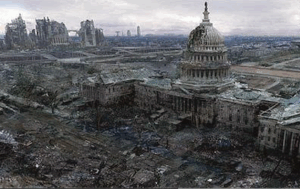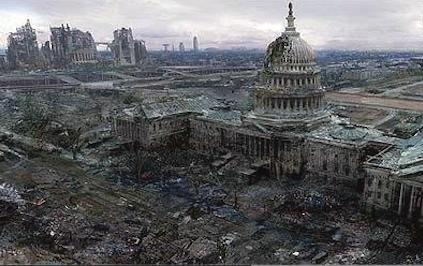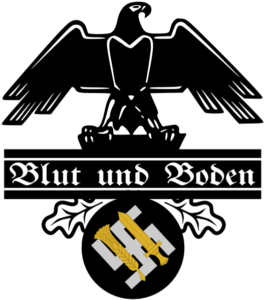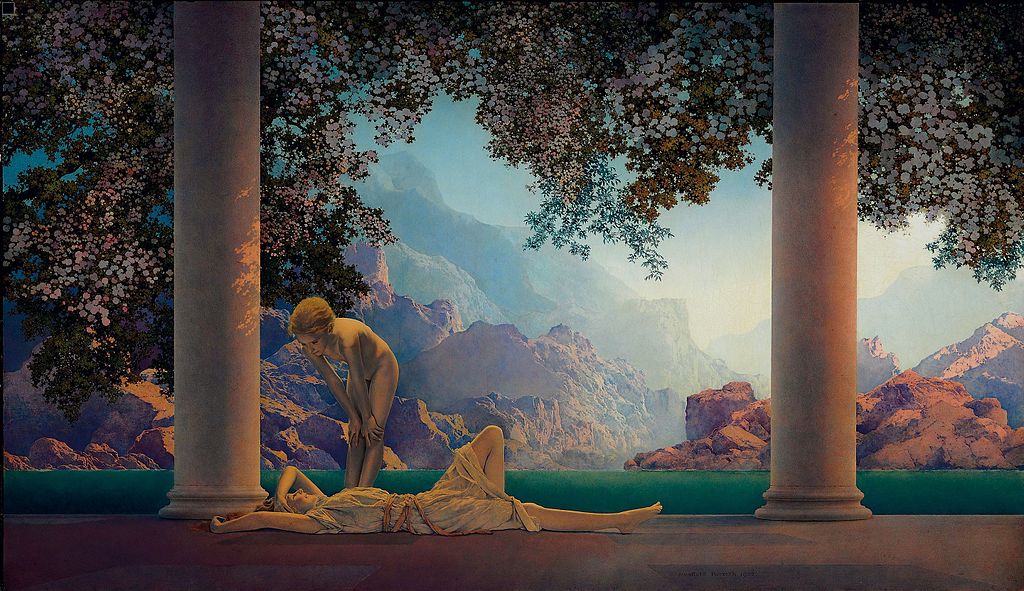If a submarine with nuclear warheads were to fall into my hands, before the forces of evil could neutralize me, I would try to destroy the System by launching missiles at New York (especially where Jewish financial power is concentrated), Washington (whoever wins the elections always ends up being a lackey of Israel), Jerusalem (nothing I hate more than seeing Western leaders at the Wailing Wall with a kippah), Tel Aviv (so that Muslims can then commit a second holocaust when radiation clears), Los Angeles at Hollywood (so that they don’t poison white men any further with their movies), Moscow (as revenge for what the Russians and their Asian troops did during the Hellstorm Holocaust), Beijing (so that the Chinese don’t emerge victorious after the skirmish), Mecca (nor the Muslims), Berlin (with the American Diktat, after 1945 the Germans have been suffering from a Stockholm syndrome to the nth degree; nuking them at the seat of their anti-Nazi power would help them break the spell), Paris (they deserve it because that’s where atheist neochristianity arose), London (imperative to nuke the city that boasts the most billboards of English women with nigger partners in the streets), and finally the Vatican because of what Nietzsche says on the last page of The Antichrist.
Tag: Genuine spirituality
Responding
to Robert
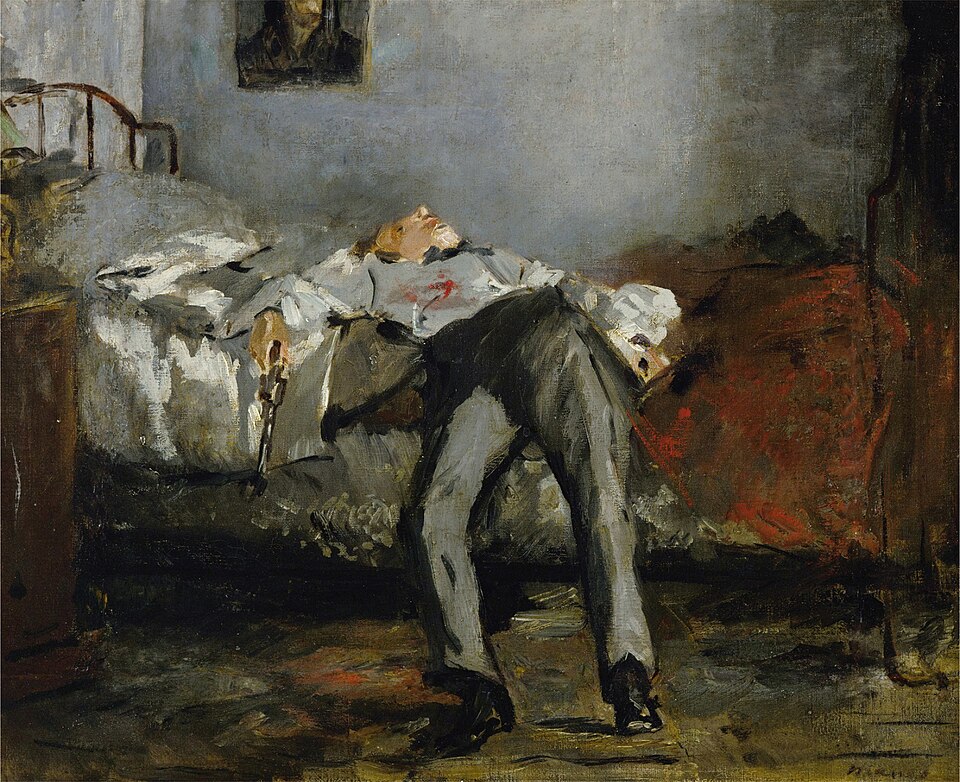
Le Suicidé by Manet (ca. 1877-1891).
This morning, Robert commented on this site. I empathise with him because I feel the same way: Kali Yuga is killing the spirit of noble men, while all we see around us is racial betrayal and the cult of ugliness (the antithesis of the benign world in Germany glimpsed in the Beethoven film I recently promoted). Since I, too, especially in the mornings when I wake up, find myself in a state of anxious despair that eats away at my soul, I understand Robert.
But we know the medicine.
Robert: Have you read the featured article carefully?
The solution to our dilemma lies in forming a brotherhood of the sacred words. That obviously implies that some of us priests live together. I find it pathological that we live so far apart. If we lived together, it would be very easy to plan the content of the next podcast: it would be a daily show, almost every day of the year, in which two or three priests would sit around a round table to discuss current affairs (I mentioned something about this in my post on 17 December).
Precisely because that podcast would show how folk like Nick Fuentes are stuck in the middle of the Rubicon, with us talking on solid ground on the other side of the river, it would be the most radical audio-visual podcast of all the racialist forums, without comparison!
I don’t know if you’ve read my article on depression. Depression is hatred/anger repressed due to the norms of stupid society, whether it be to comply with the fourth Judeo-Christian commandment, or in our case, because we are atomised due to the idiotic behaviour of “white nationalists” who don’t live under the same roof to create the proper Männerbund.
But simply living together wouldn’t be enough to cure us of depression. What cures us is open, inflammatory, blatant and public genocidal hatred: what we would do daily in the podcasts!
Of course, that would be unnecessary if there were already a revolution, at least in a Western country: we would simply go there to fight, even if we died in the fray. But there is no revolution because all Aryan men, including white nationalists, share ethnosuicidal Christian ethics (as we saw recently when discussing Richard Spencer’s recent interview with Fuentes).
It is Christian ethics that we must first break down so that Aryan men dare to do something substantial in the real world (although, for the moment, only at the podcast level). Being atomised will only continue to destroy our spirit. Alas, some make these podcasts in the wrong country, like our friends Joseph Walsh and Chris Gibbons, who are serving years in prison in the UK due to their Black Wolf Radio.
If Europeans took their priestly vows (cf. the featured article once again), they could come to a country where it would be possible to have an audio-visual equivalent of Black Wolf Radio without running afoul of European, Canadian or Australian laws, whose governments seem intent on eradicating white populations (that also happens in the US, but at least they have the First Amendment there).
While you take your vows, as I suggested today, read William Pierce’s novel. It will immediately lift you out of your depression. But it will return after a day when you finish it, because there are no men like that in the West. Racialists are all like those women I was talking about recently (the refugee ladies during the Battle of Blackwater). They are so feminised that they are waiting for a hero on a white horse to come and rescue them, instead of being that hero themselves.
This sheds light on my post about the Eroica Symphony and why it made me cry: those were times when the ideals of the French Revolution inspired Beethoven, although, as we see in the film, he later tore up the page, very angry, on which he dedicated the symphony to Napoleon when he crowned himself emperor.
Understanding that music and getting out of depression are two sides of the same coin (Beethoven himself harboured suicidal ideation before composing the Eroica). Regarding us, only by living together will it be possible to have a kind of Spartan Syssitia that lifts our spirits. (The alternative is becoming prey to the noonday demons and ending up like the guy in Manet’s painting.)
4th video
Here I begin to expose Society, which betrayed and drove my sister mad.
I’m uploading this series of videos because only broken people are capable of generating the right gravitas to understand what’s happening in the world.
A question…
I recently mentioned the film The Village, and yesterday I watched the most exquisite scenes.
What impressed me most were the shots of the lead actress, and how she acted, perfectly imitating 19th-century mannerisms: how American women used to behave. I kept telling myself, awestruck, that this woman was absolutely beautiful, and I imagined what it would be like to marry such a creature and constantly gaze upon her! The story is simply a fairy tale, but what’s worthwhile is that only white people appear in the film, and the director’s artistic virtuosity is evident in quite a few shots.
In the end, I was surprised that the director—an Indian man!—was also the producer and writer of that 2004 film. It’s true that one of my two favourite films for the sacred words, P&P (2005) and S&S (1995), both based on Jane Austen novels, was also filmed in this century. But both were filmed in England. As for LOTR, it was filmed in New Zealand.
Aside from The Village, written, produced, and directed by an Indian man, is there an American film from this century that stars a young woman whose mannerisms overwhelmingly inspire a man to marry someone like her, but filmed by a white man? It’s not about beautiful women appearing on the big screen. It’s about any movie inspiring a white man to marry someone like that heavenly creature.
Does such 21st century American film exist…?
Blade Runner
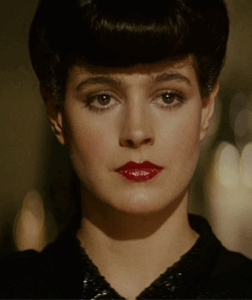 Yesterday and the day before yesterday, I was watching a few clips on YouTube of Ridley Scott’s final cuts of Blade Runner. I saw the original one on the big screen in 1982 at the old Cine Tlalpan (there are almost no white people in Tlalpan, but I distinctly remember that the day I watched the film, a young, blond woman had gone to that theatre alone).
Yesterday and the day before yesterday, I was watching a few clips on YouTube of Ridley Scott’s final cuts of Blade Runner. I saw the original one on the big screen in 1982 at the old Cine Tlalpan (there are almost no white people in Tlalpan, but I distinctly remember that the day I watched the film, a young, blond woman had gone to that theatre alone).
I was never a fan of that film.
Recently, in the comments section, I said that Sense & Sensibility (1995) and Pride & Prejudice (2005) should be the favourite films of us priests of the sacred words, because that’s the world we should be fighting for: the world that enthrones Aryan heterosexuality in the sense of culminating the plots of those films with marriages that would breed white kids: a patriarchal world in the sense that the power to reproduce rests with men. (In the crazy feminist world we live in, that power rests with women, which is why Aryans are becoming extinct around the globe.)
Those films based on Jane Austen’s novels, written before the psychosis of feminism began, could very well have been filmed in a world where Hitler had won the war.
The abysmal difference between us priests and the American racial right is that the latter, as I said a couple of days ago, are incapable of fully crossing the psychological Rubicon. In fact, many of them love films that repel the priest, as can be seen in the comment threads on Counter-Currents when they comment on movie articles by Trevor Lynch.
Blade Runner should repel National Socialists because, like thousands of films, it is the antithesis of Austen’s worlds. All of contemporary Hollywood, Netflix, and even so-called European art cinema reflect the dystopia of Kali Yuga in its purest form. And don’t tell me that filming dystopias is good for preventing them since Ridley Scott, in one of the Alien prequels, featured a pure Nordid woman fornicating with a Negro, in addition to the sacrilege of using the soundtrack of the aforementioned P&P version for grotesque sex scenes in his recent film about Napoleon.
The vast majority of Hollywood film producers should be executed on the Day of the Rope: passages from Pierce’s novel that I recently quoted on this site. In fact, I’d like to execute even those who like these films, but as Pierce’s character said in the novel, we couldn’t do it because we’d run out of Aryan males! (males who have to impregnate nymphs as cute as Rachael in the film, pictured above). That’s the priest’s dilemma: he wants to exterminate them all, but at the same time he needs their DNA for a renewed, Austen-like world.
Having said all that, I confess there’s a line I love from Blade Runner. The actor played by Harrison Ford invites Rachael to a bar and she, a very refined nymph, tells him “It’s not my kind of place.”
I’d say that about all theatres where movies are shown.
In honour
of The Turner Diaries, 9
Since then he has been issuing idiotic proclamations about “restoring the Constitution,” stamping out “communism and pornography,” and holding new elections to “re-establish the republican form of government intended by the Founding Fathers,” whatever that means.
And he has denounced our radical measures in the south as “communism.” He is appalled that we didn’t hold some sort of public referendum before expelling the non-Whites and that we didn’t give individual trials to the Jews and race-criminals we dealt with summarily.
Doesn’t the old fool understand that the American people voted themselves into the mess they’re in now? Doesn’t he understand that the Jews have taken over the country fair and square, according to the Constitution? Doesn’t he understand that the common people have already had their fling at self-government, and they blew it?
Where does he think new elections can possibly lead now, with this generation of TV-conditioned voters, except right back into the same Jewish pigsty? And how does he think we could have solved our problems down here, except by the radical measures we used?
Doesn’t Harding understand that the chaos in his area will continue to grow worse until he identifies the categories of people responsible for that chaos and deals with them categorically—that it is physically impossible, considering the relative numbers involved, for him to deal with the Jews, the Blacks, the Chicanos, and the other troublesome elements on an individual basis?
Apparently not, because the idiot is still making appeals to “responsible” Black leaders and to “patriotic” Jews to help him restore order. Harding, like conservatives in general, can’t bring himself to do what must be done, because it would mean punishing the “innocent” along with the “guilty,” the “good” Negroes and the “loyal” Jews along with the rest—as if those terms had any meaning in the present context. And so, afraid of treating individuals “unjustly,” he is floundering around helplessly while everything goes to hell and the civilians in his area die like flies from starvation. Generals should be made of sterner stuff. […]
We are laying the foundations here for the new social order which will serve our race for the next thousand years.
And to be able to live and work in a sane, healthy, White man’s world—that is something which is beyond valuation for me. These last few weeks have been wondertul. It is terribly depressing to think of leaving this White oasis and plunging once again into that cesspool of mongrels and Blacks and Jews and sick, twisted White liberals out there. [pages 173-175]
______ 卐 ______
Then, after they learned to fear us, they were all too eager to please us. But they weren’t really interested in the rights and wrongs of the struggle; they couldn’t be bothered with soul-searching and long-range considerations. Their attitude was: “Just tell us what we’re supposed to believe, and we’ll believe it.” They just wanted to be safe and comfortable again as soon as possible. And they weren’t being cynical; they weren’t jaded sophisticates, but ordinary people.
The fact is that the ordinary people are not really much less culpable than the not-so-ordinary people, than the pillars of the System. Take the political police, as an example. Most of them— the White ones—are not especially evil men. They serve evil masters, but they rationalize what they do; they justify it to themselves, some in patriotic terms (“protecting our free and democratic way of life”) and some in religious or ideological terms (“upholding Christian ideals of equality and justice”). One can call them hypocrites—one can point out that they deliberately avoid thinking about anything which might call into question the validity of the shallow catch-phrases with which they justify themselves—but is not everyone who has tolerated the System also a hypocrite, whether he actively supported it or not? Is not everyone who mindlessly parrots the same catch-phrases, refusing to examine their implications and contradictions, whether he uses them as justifications for his deeds or not, also to be blamed?
I cannot think of any segment of White society, from the Maryland rednecks and their families whose radioactive bodies we bulldozed into a huge pit a few days ago to the university professors we strung up in Los Angeles last July, which can truly claim that it did not deserve what happened to it. […]
No, talk of “innocents” has no meaning. We must look at our situation collectively, in a race-wide sense. We must understand that our race is like a cancer patient undergoing drastic surgery in order to save his life. There is no sense in asking whether the tissue being cut out now is “innocent” or not. That is no more reasonable than trying to distinguish the “good” Jews from the bad ones—or, as some of our thicker-skulled “good ol’ boys” still insist on trying, separating the “good niggers” from the rest of their race.
The fact is that we are all responsible, as individuals, for the morals and the behavior of our race as a whole. There is no evading that responsibility, in the long run, any more for the members of our own race than for those of other races, and each of us individually must be prepared to be called to account for that responsibility at any time. In these days many are being called. [pages 196-198]
Terre et Peuple
Blut und Boden
Unless whites wake up, due to mass immigration throughout the West, Caucasian Americans and Europeans will become a minority in their own countries, facing subsequent extinction.
The notion that every people needs their own land is absolutely essential. The white race must acquire a Homeland of its own, some place on earth where white children can be born and raised in physical and spiritual safety, and where the numbers of European-descended peoples may be restored and the threat of racial extinction overcome.
Manifesto
“The worst form of inequality
is to try to make unequal things equal.”
—Aristotle
“Equality is a slogan based on envy.”
—Alexis de Tocqueville
First article.— Western civilisation is under the grip of an anti-white ideology that has been imposed in every white country after the Second World War.
Second article.—The fair race is being exterminated by genocidal levels of immigration: a wholesale European, North American and Australian population replacement for non-whites.
Third article.—Ergo, the twenty-first century will be the darkest hour for the fair race.
Fourth article.—Whites either gain a sense of themselves or they are going extinct.
Fifth article.—Only an ethnostate will save them from extinction.
Sixth article.—If the ethnostate is formed, a constitution may start with the words: We hold these truths to be self-evident: Men are created unequal. All men are unequal—nowhere in the natural world, and Man is part of Nature, is anything equal. Equality does not exist in Nature; only in the abstract world of mathematics and in the minds of delusional humans.
Seventh article.—The rest follows from this…
Daybreak is a painting that Maxfield Parrish made a hundred years ago. He referred to it as his “great painting” and has been regarded by some as the most popular art print of the 20th century. It reflects the numinous spirit of this site: May the beauty of the White Aryan Woman not disappear from the Earth!
Honour
As I have said many times, when it comes to Americans, I feel much more comfortable with the racists of the 20th century (Rockwell, Oliver, Pierce) than with the racialists of the 21st century, whom I call neonormies. In the last century, American racists didn’t yet make ubiquitous use of the internet because it only began to be used by the end of the century, and even before the internet they were men of honour. With the miracle of the internet, one might expect racism to improve in the present century. But it is much worse, as I have been saying recently in my comments on quotes from online articles I read sixteen years ago, when I discovered white nationalism.
How is that possible?
In these times, and thanks to the internet, the most relevant piece of information for transvaluing values is that the Allies committed a Holocaust against Germans even after 1945: the greatest secret in recent history because the victors write history—and lie by omission by not talking about it. That’s why in my featured article the first thing I recommend is Goodrich’s Hellstorm.
The greatest pathology of white nationalism in our century is that this true Holocaust of defenceless Germans is not constantly mentioned. We can expect normies like Judge Napolitano and Col. Douglas Macgregor to be able to concede that if Hitler had won the war, the Allies would have been put in the dock for war crimes at Nuremberg (as they said today). But they cite the American bombing of Japan as an example of an holocaust, not Germany!
They are normies but what about racialists? Since Counter-Currents published a review of Goodrich’s book in 2010, there is no excuse for white nationalists, as after that year the subject is no longer mentioned in their forums. That is a sin, a voluntary surrender to evil (the anti-Christian that I am sometimes likes to use Christian vocabulary!). It is neither more nor less than the greatest of sins, pride in the form of patriotardism as Canadian Sebastian Ronin pointed out years ago when talking about them.
Few racialists comment constantly here because the Holocaust perpetrated by Americans of the best Europeans that the West has ever produced is hard to swallow. Better to repress it all! In other words, they induce a neurosis, or rather a psychosis, similar to the liberal folie en masse of the normies throughout the entire West.
All this has to do with honour, as I say in “All is about valour and honesty” (pages 46-51 of Daybreak). Honour is a word that today seems like a swear word because there are no longer any honourable Aryan men, only lobotomized eunuchs with zero Lebenskraft. In Kali Yuga, as the Indo-Aryans would call it, this word, honour, is no longer heard because all white people have degenerated. Otherwise, thousands of websites would mention the Hellstorm Holocaust, where the victims were not Jews, but Germans.
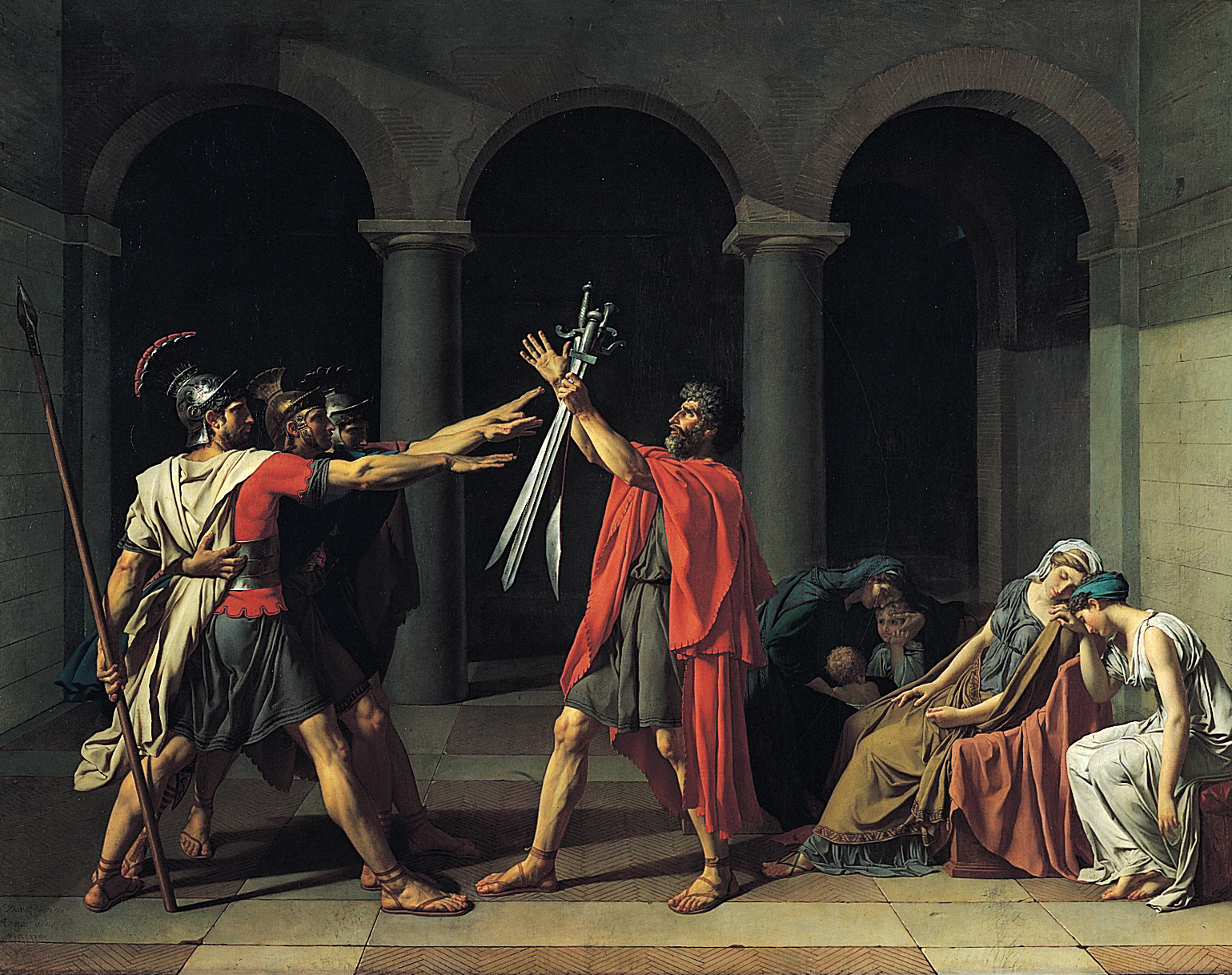
Le Serment des Horaces depicts the honour of the hard Roman ethos.
The 21st century will be a century of iron and storms. It will not resemble those harmonious futures predicted up to the 1970s. It will not be the global village prophesied by Marshall McLuhan in 1966, or Bill Gates’ planetary network, or Francis Fukuyama’s end of history: a liberal global civilisation directed by a universal state.
The third age of European civilisation commences, in a tragic acceleration of the historical process, with the Treaty of Versailles and the end of the civil war of 1914-18: the catastrophic 20th century. Four generations were enough to undo the labour of more than forty.
Europe fell victim to its own tragic prometheanism, its own opening to the world and universalism, oblivious of all ethnic solidarity. The fourth age of European civilisation begins today. It will be the age of rebirth or perdition. The 21st century will be for this civilisation, the fateful century, the century of Life or Death.
Let us cultivate the pessimistic optimism of Nietzsche. “There is no more order to conserve; it is necessary to create a new one.” Will the beginning of the 21st century be difficult? Are all the indicators in the red? So much the better. They predicted the end of history after the collapse of the USSR? We wish to speed its return: thunderous, bellicose, and archaic. Islam resumes its wars of conquest. China and India wish to become superpowers. And so forth.
The 21st century will be placed under the double sign of Mars, the God of war, and of Hephaestus, the God who forges swords, the master of technology and the chthonic fires. This century will be that of the metamorphic rebirth of Europe, like the phoenix, or of its disappearance as a historical civilisation and its transformation into a cosmopolitan and sterile Luna Park.
The beginning of the 21st century will be the despairing midnight of the world of which Hölderlin spoke. But it is always darkest before the dawn. Let us prepare our children for war. Let us educate our youth, be it only a minority, as a new aristocracy [emphasis added by Ed!]. Today we need more than morality. We need hypermorality, the Nietzschean ethics of difficult times.
When one defends one’s people, i.e., one’s own children, one defends the essential. Then one follows the rule of Agamemnon and Leonidas but also of Charles Martel: what prevails is the law of the sword, whose bronze or steel reflects the glare of the sun.
—Guillaume Faye
Thus spake…
Editor’s note: The following words from Nietzsche’s Zarathustra epitomise what I meant the day before yesterday when I mentioned that Hitler believed that overmanhood could only arise on Earth, and that his love for painting was much deeper than the average racialist can imagine (e.g., ancient painters like Claude Lorrain or modern ones like Parrish motivated me to take my vows in the priesthood of the sacred words).
______ 卐 ______
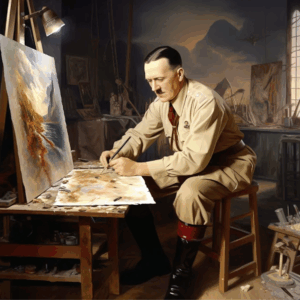 Behold, I teach you the overman!
Behold, I teach you the overman!
The overman is the meaning of the earth. Let your will say: the overman shall be the meaning of the earth!
I beseech you, my brothers, remain faithful to the earth and do not believe those who speak to you of extraterrestrial hopes! They are mixers of poisons whether they know it or not.
They are despisers of life, dying off and self-poisoned, of whom the earth is weary: so let them fade away!
Once the sacrilege against God was the greatest sacrilege, but God died, and then all these desecrators died. Now to desecrate the earth is the most terrible thing, and to esteem the bowels of the unfathomable higher than the meaning of the earth!
Once the soul gazed contemptuously at the body, and then such contempt was the highest thing: it wanted the body gaunt, ghastly, starved. Thus it intended to escape the body and the earth.
Oh this soul was gaunt, ghastly and starved, and cruelty was the lust of this soul!
But you, too, my brothers, tell me: what does your body proclaim about your soul? Is your soul not poverty and filth and a pitiful contentment?
Truly, mankind is a polluted stream. One has to be a sea to take in a polluted stream without becoming unclean.
Behold, I teach you the overman: he is this sea, in him your great contempt can go under.
